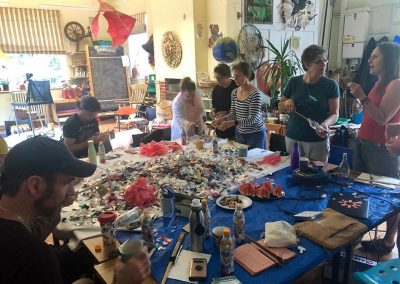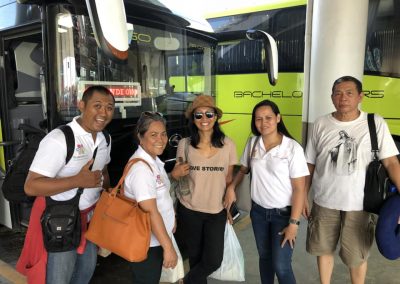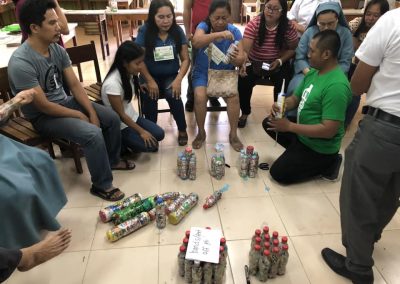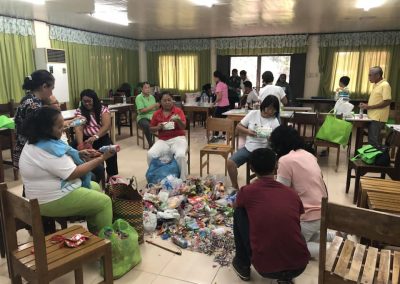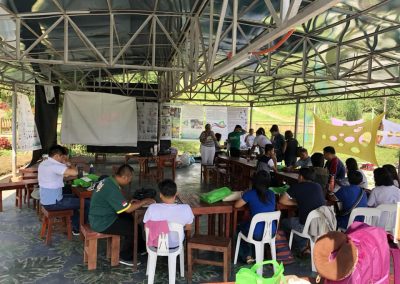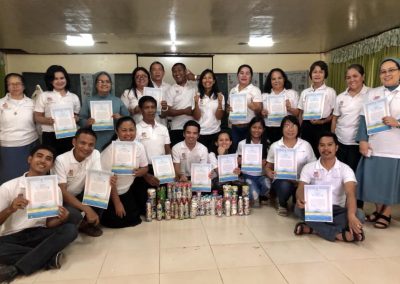SplitVision: A Collaborative Balancing

Here at the Global Ecobrick Alliance we’re focused on regenerative innovations that energize plastic transition. Our inspiration often comes from out of the blue! An email from a Swedish plastic packaging producer forever altered our perspective on companies producing plastic and opened the flood gates for powerful collaborations between businesses and communities, large and small.
As plastic pollution becomes more and more visible in and on beaches, river shores, fields and forests around the world, public skepticism of the companies that produce this plastic has increased. Indeed, every year companies and corporations package and ship goods in plastic that inevitably are disposed into the biosphere. These companies profit from the usage of plastic, without paying any of the costs involved with the long-term end-of-life consequences of this plastic.
Even when that packaging is recyclable, it is often shipped and sold in countries where recycling facilities don’t exist. And even when it is sold and consumed in countries where industrial recycling facilities do exist– this process involves shipping the plastic out of that country to a place where environmental regulations are lax or non-existent. The result– companies that use plastic are injecting countless tons of plastic into the biosphere every year. According to the May 2019 report: Plastic & Climate: The Hidden Costs of a Plastic Planet the lifecycle of this plastic produces CO2, results in microplastics, toxins and green house gas emmissions that are growing every year.
Yet, often enough, these companies understand even better than consumers and environmentalists the dynamics and consequence of plastic consumption and production. This was the case in early 2018, when we received an email from Matts and Anna. Representing Splitvision, a plastic product design and production company in Sweden, we were so intrigued by their well informed email that we set up a call. Splitvision designs plastic products and oversees their production for clients– such as hearing aid cases.
We were doubtful at first. Yet this was slowly overcome by their persistence and knowledge. Matts and Anna not only thoroughly understood the troublesome global dynamics of plastic production and recycling, they were adamant about doing something about it. They realized that although the packaging and products they were manufacturing for clients were 100% recyclable (long-lasting HDPE) they realized that inevitably, the plastic would fall out of the industrial recycling loop and end up in a country where it could not be dealt with. They expressed a deep urgency to take full responsibility for their plastic production.
They had heard about ecobricks and wanted to know if we could work together.
Until this point, the GEA had been focused on individuals, households, schools and communities. Guided by our core principle of ‘personal responsibility‘ we were concentrating on developing and disseminating the means for individuals to take personal responsibility for their plastic consumption.
In our skepticism of plastic producers, we hadn’t yet considered how companies could take responsibility for their plastic production.
The GEA at this time was researching the petrochemical and economic origins of plastic production. Through direct consultations with petrochemical plant managers we had come to learn that one of the reasons for the cheap widespread availability of plastic was its origins in crude oil refining. When a barrel of crude oil is refined to produce gasoline, jet fuel, lubricants and other high-value and high-energy applications, there is an inevitable 2-14% residual (depending on the origin of the crude and the factory settings) that cannot be so refined. This residue is known as ‘naphtha’– which happens to be the ideal feed stock for plastic polymer production. As a consequence of our civilization’s petro powered global economy– we generate lots of naphtha that needs a usage.
We realized that the petro-capital economy essentially subsidizes the cheap, abundant and endless production of plastic. Do you get around in a petroleum powered vehicle? Did your food get transported by a truck or ship? The culpability for plastic production doesn’t rest any one company or consumer or politician. We’re all in this together.
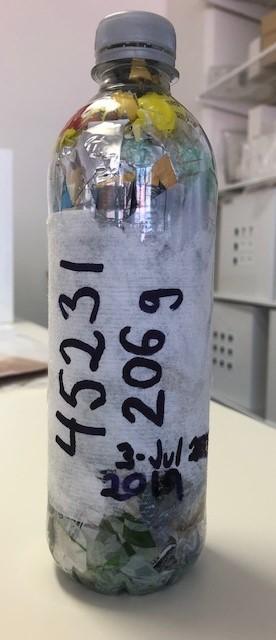
A Swedish Ecobrick by Anna Wendahl from SplitVision
When we saw the ecobricks of Matts and Anna logged on our GoBrik system, the last of our hesitation was overcome. We began to brainstorm. How could the GEA work with companies in the same way we’ve been working with individuals to cultivate personal responsibility? If we could work with the enthusiasm of Splitvision without compromising any of our core principles, then the potential for incredible social impact was imminent!
And this is exactly what has happened.
We realized that together we could enable an epic collaborative balancing act. On the one hand, SplitVision was responsible for putting plastic into the biosphere, while the GEA was focused on preventing and removing it. If somehow we could offer the securing of plastic from the biosphere as a service to Splitvision, then they would able to assist us with this goal. The fee for our service would serve both as a self-imposed plastic tax (and encouragement for them to transition from plastic) and a revenue for the GEA to continue and expand our work and impact.
Most importantly we would be working on a level of peer-to-peer, enterprise-to-enterprise. In this way we would be transcending the old model of “Corporate Social Responsibility” where companies “donate” a small percentage of their profits to charities or NGOs in a non-business exchange. Instead, by framing the collaboration as a transaction it compelled us to precisely quantify the service we were offering SplitVision for their payment. And it compelled SplitVision to add a business expense to their usage of plastic. This expense began to account for the ecological impact of their usage and profit from plastic– what had before been missing in traditional petro-capital accounting.

25 new graduated GEA Trainers from our 2018 Tagaytay, Philippines, three day Training of Trainers that was catalyzed by SplitVision.
The most important activity of the Global Ecobrick Alliance is running Training of Trainer (ToT) workshops. It is also our most costly and logistically challenging activity. These three-day events involve up to 50 ecobrickers and can transform cities and regions within months as the new trainers fan out, run trainings, and spread plastic awareness and ecobricking to thousands. Bolstered by SplitVision’s initial encouragement, we developed our GoBrik app so that as ecobrickers log their ecobricks, we can tag the ecobricks– tracing them back to the specific Training of Trainers that got them started!
In this way, we were able to estimate the net amount of plastic that would be ecobricked in a given ToT and offer this amount of plastic for sale to SplitVision in return for ‘catalyzing’ our ToTs. SplitVision obliged us and our early, bumpy initial systems to support almost half a dozen such Training of Trainers throughout Indonesia, the Philippines and the UK. By paying the catalyst fee for each training, they enabled us to do our work, and develop the global tracking infrastructure.
Through these trainings we now have 73 trainers, 17,347 ecobricks made, 524 Communities catalyzed, 105,750 Kg of CO2 and 5,441 Kg of plastic sequestered.
Our systems are now greatly advanced since these early ToTs. We’ve established a full fledged Catalyst Program for companies like SplitVision.
Companies who joing the program, must commit to the principles of deep plastic transition. This means leading by example from their owners and managers to their staff. They must commit to tracking their plastic consumption and production– while we track for them the amount of plastic that their staff and partner communities pack. At the end of the year we tally these up to establish their yearly Plastic Transition Ration (PTR). Their yearly catalyst program fee is then reduced by a function of their PTR (so, the higher their plastic transition ratio, the less their catalyst program fee!). This provides a self-elected financial incentive to direct their company towards deep plastic transition.
We’re grateful for the inspiration of SplitVision. Companies need not wait for the latest biodegradeable breakthrough, some new technology, or spending millions of dollars. The journey of plastic transition begins with simple commitment. It has little to do with new technology, and everything to do with a switch in thinking from lines to circles.
The GEA Catalyst Program is now open for keen green companies everywhere to join.
In 2020 we are poised to unleash even more powerful plastic tracking and plastic offset tools. In the new year our Brikcoin manual blockchain will enable the direct purchase of plastic offsets by companies and individuals. Companies will be able to list their products for sale on our app in Brikcoins– the sale of which will generate plastic offsets for the company. Stay posted, this story isn’t over yet!
UK Ecobrick Training of Trainers
Catalyzed by SplitVision, New Forest, UK, July 2019 >> See full report on UK 2019 Trainings
Philipines Ecobrick Training of Trainers
Catalyzed by SplitVision, 2018 >> See the full article

For Companies
The GEA Catalyst Program eanables companies large and small to take their Green Business to a whole new level!

SplitVision Impact Stats
As part of the GEA Catalyst Program, Splitvision tracks and discloses its plastic generation stats. These stats are then compared to their activities sequestering plastic. The Catalyst program software automatically registers and credits splitvision for ecobricks logged by the trainers, ecobrickers, and communities that have been catalyzed by the company.
“Our culture’s plastic situation isn’t the fault of plastic producing companies or corporation. It is a reflection of our civilizational and species evolution. We have to come together to solve plastic pollution.”
– Russell Maier, GEA co-founder.




